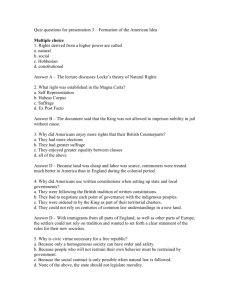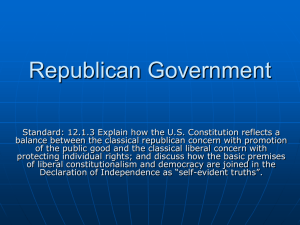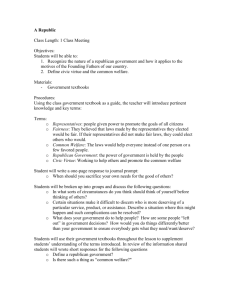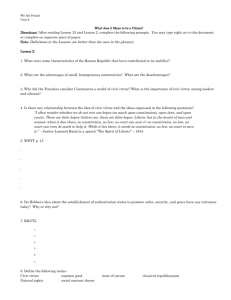File
advertisement
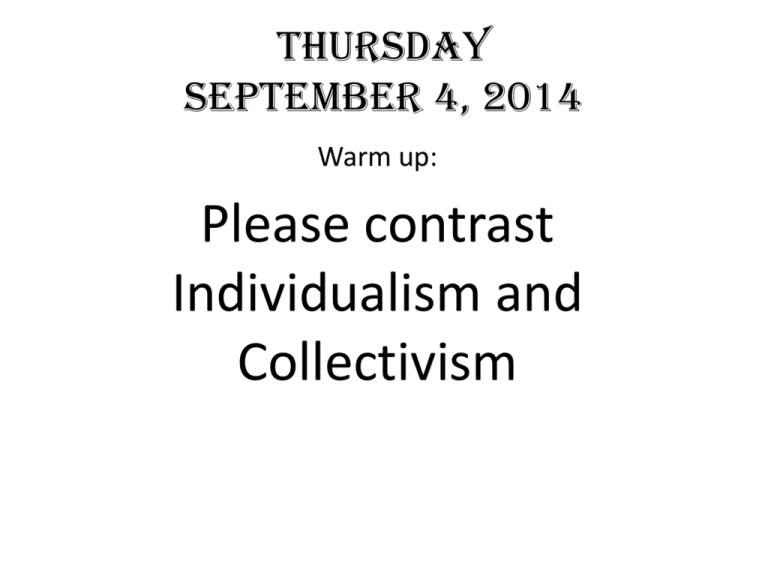
Thursday September 4, 2014 Warm up: Please contrast Individualism and Collectivism Individualism: Social theory favoring freedom of action for individuals over the collective or state control. Being independent and self reliant. Collectivism: Marked by similarity among members of a group holds that man must be chained to collective action and collective thought for the sake of what is called 'the common good'. PIE PARAGRAPHS and outlines Today’s Objectives: • Summarize the importance of civic virtue in both Classical Republicanism and in our modern American Government. • Explain how classical republicanism and natural rights philosophy influenced the U.S. Constitution. Identify the differences between the two! John Locke- Natural Rights Philosophy • Stressed that human nature is such that individual behavior is motivated by self-interest. • Stressed that society is a collection of individuals. Each sharing the same right to pursue his or her own welfare and happiness. • Stressed that opportunities should not be limited by the situation or group in which they are born. • The government existed to serve the interests of the people. • To preserve natural rights, governments guarantee specific liberties. Classical Republicanism • Stressed that individuals should be motivated by civic virtue. • Limited individual rights to privacy, beliefs, political expression, and opportunities to read, travel, think freely and earn money. • Discouraged diversity of beliefs, wealth, and way of life. • Favored small communities where people know and care for each other. Cincinnatus and Washington: Models of Civic Virtue As we have discussed this week, civic virtue was considered essential to the success of the Roman Republic. Our founding fathers also valued civic virtue in their leaders. Cincinnatus- 5th century B.C. Ancient Rome •Cincinnatus was once a Consul in the Roman Republic who had retired to his farm after his service to the Republic. •In retirement, he chose to live simply as a farmer (a noble pursuit in the days of ancient Rome). He worked 4 acres of land. Cincinnatus- 5th century B.C. Ancient Rome •In the year 460 BC, Rome was in great danger. •An army from the east was burning and plundering the countryside. •A Roman army had been sent to stop the advance of the invading army, but they were quickly surrounded on all sides. •Messengers were sent to his farm and offered him the position of dictator to save the Republic "Put on thy robe and hear the words of the people." Cincinnatus- 5th century B.C. Ancient Rome •Under the leadership of Cincinnatus, the Roman army defeated the invaders in a battle which lasted two days. •Upon his return to Rome, Cincinnatus was hailed as dictator. •Rather than take power from the Senate, Cincinnatus returned to his farm to resume his life as a Roman farmer. •Cincinnatus proved through his actions that he valued being a good citizen more than he valued fame and power. Cincinnatus Video • http://youtu.be/71eY67Ht4Lo George Washington: “First in the hearts of his countrymen” •George Washington led the Continental Army during the Revolutionary War (1776-1783) •As you know, Washington was revered both as a military leader and as a symbol of American virtue •“He is polite with dignity, affable without formality, distant without haughtiness, grave without austerity; modest, wise and good.” - Abigail Adams George Washington: “First in the hearts of his countrymen” •After the Revolutionary War…Washington resigns his position as commander of the Continental Army and returns to Mt. Vernon (his home in Virginia). •After the new Constitution was ratified and the first presidential election was won by Washington, he served only two terms. Could Washington have continued as President? Groups of 2-3…one person must record discussion results (10 min.) Who exhibits Civic Virtue in America today? Explain… What historical figures have exhibited Civic Virtue? Explain… Civic Virtue (examples) Pat Tillman Oprah Winfrey: Actively supports through charities and involvement: Abuse, Adoption, Fostering, Orphans, AIDS, Animals, Cancer, Children, Creative Arts, Disaster Relief, Economic/Business Support, Education, Environment, Family/Parent Support, Health, Human Rights, Hunger, Miscellaneous, Peace, Poverty, Rape/Sexual Abuse, Women Bill Gates: “From those who are given great resources great things are expected.” Charitable Work: AIDS, Animals, AtRisk/Disadvantaged Youths, Children, Education, Environment, Family/Parent Support, Health, Homelessness, Hunger, Poverty Civic Virtue…Final thought… Remember that civic virtue can still be seen in this country, this state, this community, and this school!!! Friday September 5th, 2014 Warm up • Please define the following terms –Natural rights –Common good –Civic virtue Today’s Objective • Summarize key terms • Assess Language Arts skills As we have discussed… Two of the main influences on the Founding Fathers with regard to political theory, were the Natural Rights Philosophy (John Locke) and Classical Republicanism (Roman Republic). • The Natural Rights Philosophy proposed that governments were founded for the purpose of protecting individual rights. • Classical Republicanism maintained that governments exist for the common good. How did the Founding Fathers merge the ideas of Classical Republicanism and the Natural Rights Philosophy in the U.S. Constitution? The Father of the Constitution… James Madison James Madison was largely responsible for the synthesis of these two concepts (common good and individual rights) into one system. The Father of the Constitution… James Madison Madison believed: • People working for their own self interest (individual rights) could simultaneously benefit society (common good). The Father of the Constitution… James Madison • Much of our Constitution consists of compromises between the individual and society, as do many of the controversial issues and decisions of our own day. • Examples? The Preamble…What does it tell us about the Framers and their ideas about government? We the people of the United States, in order to form a more perfect Union, establish justice, insure domestic tranquility, provide for the common defense, promote the general welfare, and secure the blessings of liberty to ourselves and our posterity, do ordain and establish this Constitution for the United States of America. The Lottery
